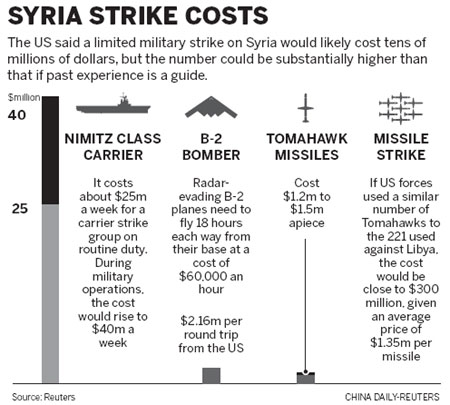More questions than answers
Many in the US remain to be convinced of Assad's role in chemical attacks
The US government insists it has the intelligence to prove it, but the American public has yet to see a single piece of concrete evidence - no satellite imagery, no transcripts of Syrian military communications - connecting the government of President Bashar al-Assad to the alleged chemical weapons attack last month that killed hundreds of people.
In the absence of such evidence, Damascus and its ally Russia have aggressively pushed another scenario - that rebels carried out the Aug 21 chemical attack. However, little or no evidence to support their theories have made it into the mainstream media.
This situation has left US citizens with more questions than answers as their military stands poised to launch airstrikes against the Syrian government.
Meanwhile, the European Union blamed the Syrian government on Saturday for the purported chemical attack but urged waiting for a report from UN weapons inspectors before any US-led military response.
The carefully worded message from foreign ministers of 28 EU governments stopped short of endorsing possible US and French military action against Syria ahead of the report, which France's president said could come by the end of the week.
The event that took place early one morning in a rebel-held Damascus suburb known as Ghouta was said to be the deadliest chemical weapons attack in Syria's civil war, which is now in the third year.
Survivors' accounts, photographs of many of the dead wrapped peacefully in white sheets and dozens of videos showing victims in spasms and gasping for breath shocked the world, moving US President Barack Obama to call for action because the use of chemical weapons crossed the "red line" he had drawn a year earlier.

Yet one week after US Secretary of State John Kerry outlined the case against Assad, US citizens - at least those without access to classified reports - haven't seen a shred of hard proof to support his claims.
There is open-source evidence that provides clues about the attack, including videos of the rockets that analysts believe were likely used. US officials on Saturday released a compilation of videos showing victims, including children, exhibiting what appear to be symptoms of nerve gas poisoning. Some experts think the size of the strike, and the amount of toxic chemicals that appear to have been delivered, make it doubtful that the rebels could have carried it out.
However, what's missing from the public record is direct proof - rather than circumstantial evidence - tying the attack to the Syrian government rather than rebel forces.
The Obama administration, searching for support from a divided Congress and skeptical world leaders, says its own assessment is based mainly on satellite and signal intelligence, including indications in the three days prior to the attack that the government was preparing to use poisonous gas.
But multiple requests to view that satellite imagery have been denied, though the administration produced copious amounts of satellite imagery earlier in the war to show the results of the Syrian government's military onslaught. When asked on Friday whether such imagery would be made available showing the Aug 21 incident, a spokesman referred The Associated Press to a map produced by the White House last week that shows what officials say are the unconfirmed areas that were attacked.
The Obama administration maintains it intercepted communications from a senior Syrian official on the use of chemical weapons, but requests to see that transcript have been denied. So has a request by the AP to see a transcript of communications allegedly ordering Syrian military personnel to prepare for a chemical weapons attack by readying gas masks.
The US administration says its evidence is classified and is only sharing details in closed-door briefings with members of Congress and key allies.
Unclear motivation
The assessment, also based on accounts by Syrian activists and hundreds of YouTube videos of the attack's aftermath, has confounded many experts who cannot fathom what might have motivated Assad to unleash weapons of mass destruction on his own people - especially while UN experts were nearby and at a time when his troops had the upper hand on the ground.
Rebels who accuse Assad of the attack have suggested he had learned of fighters' plans to advance on Damascus, his seat of power, and ordered the gassing to prevent that.
"We can't get our heads around this - why would any commander agree to rocketing a suburb of Damascus with chemical weapons for only a very short-term tactical gain for what is a long-term disaster," said Charles Heyman, a former British military officer who edits The Armed Forces of the UK, an authoritative bi-annual review of British forces.
French and Israeli intelligence assessments back the US, as does reportedly Germany's spy agency, on its conclusion the Syrian government was responsible. However, none has backed those claims with publicly presented evidence.
Some have suggested the possibility, at least in theory, that the attack may have been ordered by a "rogue commander" in Assad's military or fighters seeking to frame the government.
Testifying on Wednesday before the House Foreign Affairs Committee, US Defense Secretary Chuck Hagel rebuffed a congressman's bid to declassify one of the key pieces of intelligence Kerry publicly cited last week: intercepted communications telling Syrian military units to prepare for the chemical strikes.
Still, there was very little pushback from members of Congress on the government's conclusion that the Syrian government was responsible.
Senator Dianne Feinstein, of California, said the intelligence was "very compelling" and that senators have had more access to classified information on Syria than they've had on anything in her two decades in the Senate.
Asked if that was enough to merit a US military reaction, she said: "Yes, it's enough for me. I think the prohibition on chemical weapons is well-founded."
However, Hisham Jaber, a retired Lebanese army general who closely follows Syria's war, said it would be "political suicide" for the government to commit such an act given Obama's warning. He also questioned US assertions that the Syrian rebel fighters could not have launched sophisticated chemical weapons. He said that some among the estimated 70,000 defectors from the Syrian military, many of them now fighting for the opposition, could have been trained to use them.
"It is conceivable that one or more know how to fit a rocket or artillery shell with a chemical agent," said Jaber, who also heads the Beirut-based Middle East Center for Studies and Political Research.
The Saudi connection
He claimed Syrian insurgents have acquired chemical weapons from agents of Saudi Arabia, which may in turn have sourced them from tribes in Libya after the fall of Muammar Gadhafi. Other weapons from Libya have been used in the conflict, though Jaber did not offer evidence to support his chemical weapons claim.
However, earlier this year Turkish police reported that they had arrested members of the al-Nusra Front, a rebel group linked to al-Qaida, with a 2-kg cylinder of sarin gas, which they said was intended for a terrorist attack.
In late August, two journalists Dale Gavlak and Yahya Ababneh, reported that sources close to al-Nusra Front had admitted to accidentally setting off chemical weapons on Aug 21 that had been supplied to them secretly by Saudi agents. They said the weapons went off accidentally because they had not been trained properly in using them.
Saudi Arabia has been a chief supporter of Syria's rebel opposition. Prince Bandar bin Sultan, head of Saudi intelligence, recently flew to Moscow, reportedly on a mission to get Russia to drop its support for Assad.
Syrian government officials and Assad accused foreign fighters of carrying out the attacks with the help of countries such as Saudi Arabia and Turkey in the hopes of prompting an international military intervention.
Syria says some of its own soldiers were badly contaminated in Jobar, on the edge of Damascus, as they went into tunnels cleared by the rebels. UN experts, who had been collecting tissue and other samples from victims in Ghouta, also visited the Mazzeh military hospital in Damascus, taking samples from injured soldier there.
Two days after the Ghouta attack, state television broadcast images of plastic jugs, gas masks, medicine vials, explosives and other items that it said were seized from rebel hideouts. One barrel had "made in Saudi Arabia" stamped on it.
In the US, the case for military action has evoked comparisons to false data used by the Bush administration about weapons of mass destruction to justify the 2003 invasion of Iraq.
Multiple US officials have told AP that the intelligence pictures on the Aug 21 attack was "not a slam dunk" - a reference to then-CIA Director George Tenet's insistence in 2002 that US intelligence showed Iraq had weapons of mass destruction. Tenet's assessment turned out to be wrong.
These US experts cite the lack of a direct link between Assad and the chemical assault - a question the administration discounts by arguing Assad's responsibility as Syria's commander in chief.
A second issue is that US intelligence has lost track of some chemical weaponry, leaving a slim possibility that rebels acquired some of the deadly substances.
Russian President Vladimir Putin, meanwhile, said if there is evidence that chemical weapons have been used, specifically by the regular army, it should be submitted to the UN Security Council.
"And it ought to be convincing. It shouldn't be based on some rumors and information obtained by intelligence agencies through some kind of eavesdropping, some conversations and things like that," he told AP in an interview late on Tuesday.
AP-Reuters-AFP
|
Issa, 10 years old, carries a mortar shell in a weapons factory of the Free Syrian Army in Aleppo, on Saturday. Issa works with his father in the factory for 10 hours every day except on Fridays. Hamid Khatib / Reuters |

(China Daily 09/09/2013 page11)















